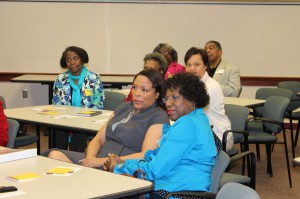 PreSERVE, and Commissioner Loretta Smith invited 35 of Portland’s black community Visionaries for a special healthy soulfood lunch & discussion to help PreSERVE Coalition identify health access needs and barriers affecting African Americans 55 and older. Here’s summary of their advice:
PreSERVE, and Commissioner Loretta Smith invited 35 of Portland’s black community Visionaries for a special healthy soulfood lunch & discussion to help PreSERVE Coalition identify health access needs and barriers affecting African Americans 55 and older. Here’s summary of their advice:
Question 1: What are the biggest barriers to healthier living for African Americans 55 and older in Portland?
You advised us that there is a lack of knowledge about healthy living and access to programs and services that could support healthy living in Portland. Some elders may not wish to seek assistance, sometimes due to fear of giving up their independence or a lack of trust of programs and providers. Community members, and caregivers in particular, need education—not only about healthy lifestyles, but about how to access services that can help. Service providers need to be respectful and culturally competent and use language with elders and their families that honors them as valued and competent individuals.
Families need to be encouraged to maintain the tradition of intergenerational care. Many need information on payment for care, including payments to family members as caregivers, and how to provide financial help and protection for seniors. Elders and caregivers need education on medication adherence, and on label literacy so they understand how to take their medications appropriately.
Diabetes is a major concern and families and elders need education on diabetes at all stages and to understand the implications that inattention to provider recommendations has on their long-term ability to thrive.
Access to healthy food at reasonable cost was a major concern and suggestions included engaging seniors and their families in gardening, connecting with local farms, and bringing food to convenient, familiar neighborhood locations for easier access
Question 2: Community engagement and outreach strategies
In response to this question, you advised us to work towards getting information about health out to elders through churches, public service announcements, Twitter, and Radio 1480. We were encouraged to reach out to men who typically don’t seek health care. We were advised to get a place on meeting agendas of local health-related groups to introduce our mission and possibly begin collaboration with existing programs.
Question 3: Who else should be involved in the conversation?
As above, you suggested we seek assistance from churches and other community organizations. We were advised to consider looking to other communities, such as the Wisdom of the Elders program used in the Native American Community, and Achieve that works on healthy-food initiatives. In summary, the information our Visionaries provided will help us shape our future work as we strive to address community-voiced needs and create programs that engage, educate, and empower older African Americans and their families to live their healthiest lives.
